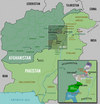 |
|
Pakistan, Afghanistan, and the tribal areas. Map from PBS' Frontline. Click to view. |
 Details of the clashes that sparked the apparent air strike remain unclear
|
Pakistan's Prime Minister Yusuf Raza Gilani has condemned an air strike by Afghanistan-based US forces that Islamabad says killed 11 of its troops.
The incident took place inside Pakistan, near the border with Afghanistan.
The US military confirmed it had used artillery and air strikes after coming under fire from "anti-Afghan" forces.
The incident comes as relations between the US and Pakistan militaries have been hit by mounting tensions.
The soldiers' deaths occurred overnight at a border post in the mountainous Gora Prai region in Mohmand, one of Pakistan's tribal areas, across the border from Afghanistan's Kunar province.
Eight Taleban militants were also killed in the clashes, a Taleban spokesman said.
'Cowardly act'
If the 11 deaths are confirmed, it would be the worst incident of its kind since US and Nato-led forces began fighting militants in Afghanistan in 2001.
Prime Minister Gilani condemned the deaths, telling parliament: "We will take a stand for the sake of this country's sovereignty, for the sake of its dignity and self-respect".
"We do not allow our territory to be used. We completely condemn this, and will take it up through the foreign office."
Pakistan's military called it a "completely unprovoked and cowardly act".
|

|
The US military said in a statement that coalition troops had come under fire from "anti-Afghan forces" in a wooded area near the Pakistan border.
The statement said artillery and air strikes had been co-ordinated with Pakistan, but that the incident was being investigated.
A spokesman for a pro-Taleban militant group in Pakistan said it had launched an attack on US and Afghan army troops trying to set up a border control post.
"We launched an attack on them from several sides and caused serious harm - and then the US and Nato forces began a series of air strikes," said the spokesman, Maulvi Umar.
Lawless border
There is increasing anger in Pakistan at US strikes on its territory which have killed more than 50 people this year, says the BBC's Barbara Plett in Islamabad.
Both US forces and Nato-led coalition forces are operating in Afghanistan, with Nato focused mainly on peacekeeping and reconstruction and the US troops working more directly to combat militant activity.
Funerals have been held for the 11 soldiers who died
Taleban fighters have a strong presence in the border areas of the tribal districts and local administrators have little power there, although security forces keep a presence on the border.
There is rising frustration among the Afghans and foreign troops at Pakistani efforts to negotiate peace deals with pro-Taleban militants on its side of the border.
Afghan and US-led forces accuse Islamabad of not doing enough to deny Taleban militants a hiding place in Pakistan's tribal areas and to stop them from infiltrating the border into Afghanistan.
They are worried that the Pakistan government's recent peace talks with the militants there will only give the Taleban more room for manoeuvre.
Pakistan denies the accusations, saying it has lost about 1,000 soldiers fighting militants in the tribal border areas.